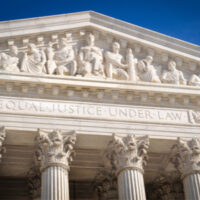US Supreme Court to Hear Crucial Free Speech Case, Where Student Was Charged for Speaking About His Religion

Free speech is a crucial First Amendment right that police and government frequently infringe upon when they choose to criminalize or otherwise target our right to express our opinions without censorship or restraint. This can often be seen when protesters are arrested for disorderly conduct or unlawful assembly, or even assault, battery, or hate crimes, in extreme cases. While the courts have carved out some exceptions to protected free speech, the requirements to fulfill these exceptions are very particular and often involve comments intended to incite imminent lawlessness (sometimes referred to as “fighting words”).
A crucial First Amendment free speech case will be heard by the US Supreme Court this fall involving to what extent schools can enact and enforce severe school speech codes that have arguably become somewhat commonplace around the country, including here in Florida. The case involves a college that designated two “free speech expression areas” consisting of a sidewalk and patio that were available during specific time slots on most weekdays, where students had to reserve them in advance, in order to engage in free speech expression. Still, one student who complied with these rules was charged with disorderly conduct because he was engaging in public speaking instead of simply distributing literature and having one-on-one conversations with passersby, with the state attorney general claiming that his speech rose to the level of “fighting words” because he “used contentious religious language” that has a “tendency to incite hostility.”
Question Remaining: Is The Case Moot If the Policy Was Overturned but The Plaintiff Originally Filed for Nominal Damages?
Soon after these charges were brought, the college abandoned this policy, and instead adopted one allowing students to speak anywhere on campus at any time without first having to obtain a permit, making the case moot, as affirmed by the United States Court of Appeals for the 11th Circuit. However, questions still remain as to whether there is still a case simply due to the plaintiff not only requesting that the policy be overturned (which has already occurred), but nominal compensatory damages as well, as courts routinely award nominal damages for constitutional violations.
If You Were Arrested While Exercising Your Free Speech Rights, Contact an Experienced Florida Civil Rights Defense Lawyer
This case will inevitably have repercussions for many who are arrested and charged with disorderly conduct each year simply for expressing their personal views. At The Baez Law Firm, our Orlando criminal defense lawyers represent clients in a number of high profile cases, including those that not only involve criminal charges, but also key civil rights issues like this. Contact us today for a free consultation to find out more.
Resource:
nytimes.com/2020/08/17/us/supreme-court-college-free-speech.html




















